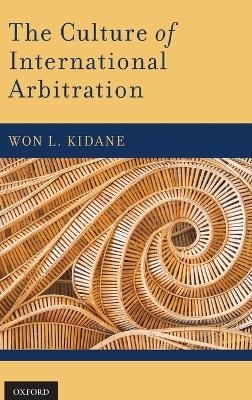
The Culture of International Arbitration
Oxford University Press Inc (Verlag)
978-0-19-997392-7 (ISBN)
Won L. Kidane is a Fulbright Scholar and a tenured Associate Professor of Law at the Seattle University School of Law, where he teaches international arbitration and litigation among other courses. He is the author of China-Africa Dispute Settlement (2011) and co-author of Litigating War: Mass Civil Injury and the Eritrea-Ethiopia Claims Commission (With Sean D. Murphy and Thomas R. Snider, OUP 2014). He has written dozens of articles published in law reviews and leading international law journals including Cornell, University of Pennsylvania, Vanderbilt, Emory, Fordham, and Wisconsin. Before becoming a professor at Seattle University Law School, he practiced as an arbitration attorney at DLA Piper and at Hunton & Williams, LLP in Washington, D.C. He is currently a partner at the Addis Law Group, LLP, a Washington D.C. based boutique international arbitration firm.
Preface
Acknowledgments
Table Of Select Abbreviations
Table Of Cases
Table Of Statutes
Table Of Conventions
Part One
Culture And The Legal Framework And Theoretical Pillars Of International Arbitation
Chapter 1: Introduction
Chapter 2: Defining Legal Culture
A. A Brief Look At Culture In Transnational Business
B. Preliminary Thoughts On Culture In International Arbitration
C. Conclusion
Chapter 3: The Political And Cultural History Of International Arbitration In Various Legal Traditions
A. The Political And Cultural History Of Contemporary International Arbitration
B. The Evolution Of The Courts' Tolerance Of International Arbitration In Various Legal Traditions
1. Common Law Legal Tradition
2. Civil Law Legal Tradition
3. Chinese Legal Tradition
4. African Legal Tradition
Chapter 4: The Theories And Theoreticians Of International Arbitration
A. The Theories And Theoreticians
1. Emmanuel Gaillard's Theory
2. Jan Paulsson's Theory
3. Catherine Rogers' Theory
4. Gary Born's Theory
5. Sundaresh Menon's Theory
6. David Caron's Theory
B. Conclusion
Chapter 5: The Evolving Justifications Of International Arbitration
A. Initial Justifications
B. Contemporary Justifications
C. Assessing The Credibility Of The Contemporary Justifications
1. Jurisdictional Justification
2. Promotional Justifications
D. Conclusion
Chapter 6: Culture And The Legal Infrastructure Of Commercial Arbitration
A. A Cultural Analysis Of The Legal Framework
1. The New York Convention
B. Conclusion
Chapter 7: Culture And The Legal Infrastructure Of Investment Arbitration
A. The Icsid Legitimacy Debate
1. Empirical Studies
2. A Closer Look At The Empirical Studies
B. A Historical Perspective
1. The Doctrinal Debate
2. Why Was Icsid Accepted?
C. Quantitative Indicators
1. Arbitrator Nationality
2. Counsel Nationality
3. Claimant Nationality
4. Location
5. Outcome On Jurisdiction
6. Outcome On The Merits
7. Allocation Of Cost
D. The Virtues Of Aristocratic Justice
1. Who Are The "Virtuous" Men?
2. Why Do The Africans Appoint The Virtuous Men?
E. Conclusion
Part Two
Deconstructing The Mythology Of Specialized Knowledge In International Arbitration
Chapter 8: Diversity In The Epistomology Of Judicial Fact Finding In The Major Legal Traditions Of The World: Indicators For Conduct In International Arbitration
A. Fact Finding In The Common Law Legal Tradition
B. Fact Finding In The Civil Law Legal Tradition
C. Fact Finding In The Chinese Legal Tradition
D. Fact Finding In Islamic Legal Tradition
E. Conclusion
Chapter 9: Fact Finding And Cultural Diversity In International Arbitration
A. Fact-Finding In The Fog
B. Culture As Fact; Fact As Culture
C. Interpretation And Application Of Law As A Cultural Practice
Chapter 10: The Typical Process For Selection And Challenge Of Arbitrators
A. Appointment And Challenge
1. Appointment
2. Challenge
3. The Conduct Of Arbitration
4. The Iba Rules On The Taking Of Evidence In International Arbitration
B. Conclusion
Chapter 11: The Mythology Of Specialized Knowledge
A. Jan Paulsson's Question: "Who's Complaining?"
1. The Audacity Of Elitism
2. Culturally Different Facts And Concepts: Applied Legal Philosophy
B. Conclusion
Chapter 12: Conversations On The Role Of Culture In International Arbitration
1. Introduction
2. Conversations File
A. Conversation With Judge Abdulqawi Yusuf, Vice President Of The International Court Of Justice.
B. Conversation With Judge Judge Xue Hanqin, Judge Of The International Court Of Justice.
C. Conversation With Judge Julia Sebutinde, Judge Of The International Court Of Justice.
D. Conversation With Jurist No. 1
E. Conversation With Jurist No. 2
F. Conversation With Jurist No. 3
G. Conversation With Jurist No. 4
H. Conversation With Mr. Thomas R. Snider
Chapter 13: Summary Of Conclusions
Bibliography
Index
| Erscheinungsdatum | 19.03.2017 |
|---|---|
| Verlagsort | New York |
| Sprache | englisch |
| Maße | 236 x 155 mm |
| Gewicht | 635 g |
| Themenwelt | Recht / Steuern ► Allgemeines / Lexika |
| Recht / Steuern ► EU / Internationales Recht | |
| Recht / Steuern ► Privatrecht / Bürgerliches Recht ► Berufs-/Gebührenrecht | |
| ISBN-10 | 0-19-997392-X / 019997392X |
| ISBN-13 | 978-0-19-997392-7 / 9780199973927 |
| Zustand | Neuware |
| Informationen gemäß Produktsicherheitsverordnung (GPSR) | |
| Haben Sie eine Frage zum Produkt? |
aus dem Bereich


